Hot Types of Asphalt Pavement | [8 Types & Features]
Asphalt pavement refers to the various types of pavement which is paved with mineral materials mixed with road asphalt materials. Asphalt binder improves the ability of granular materials to resist the damage caused by driving and natural factors, and makes the pavement flat, less dust, impermeable and durable.
Asphalt pavement is one of the most widely used high-grade pavement in road construction. The asphalt structure layer of asphalt pavement itself belongs to the range of flexible pavement, but its base course can also use rigid cement concrete or semi-rigid hydraulic material in addition to flexible material. According to different properties, asphalt pavement has many hot types.
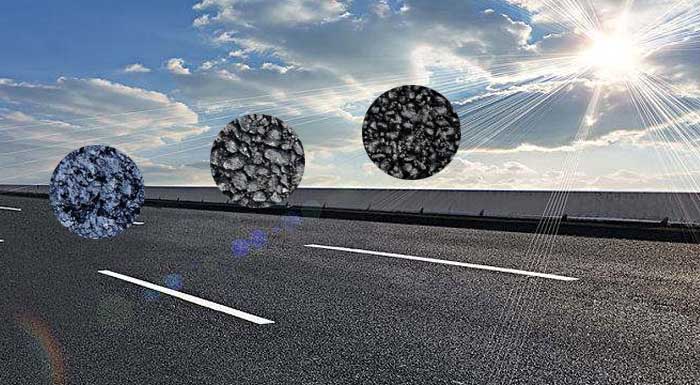
Hot 8 Types of Asphalt Pavement
1. Porous Asphalt Pavement

Compared with the ordinary asphalt pavement, the porosity of porous asphalt pavement is 15% – 20%, even more than 20%, while the porosity of ordinary asphalt pavement is only 3% – 6%.
Due to the large porosity, rainwater can penetrate into the road surface and drain away from the connected pores to the edge of the road surface. So porous asphalt pavement is also called drainage asphalt pavement.
The advantages of porous asphalt pavement include:
- Good Macroscopic Structure: Developed and interconnected pores are formed on the surface and inside the road surface, becoming a negative macroscopic structure.
- Rapid Drainage: Due to its high porosity, rainwater can quickly penetrate below the road surface and discharge from the edges of the road surface through connected pores, which is beneficial for reducing road surface water and enhancing driving safety.
- High Comfort: Due to its drainage performance, it can reduce splashing water and mist during rainy driving, improving driving comfort.
- Noise Reduction: Due to its porous structure, it can absorb the noise generated during vehicle operation and reduce noise pollution.
- Extending Service life: Its high porosity can reduce road surface water, avoid damage to the road surface caused by accumulated water, and thus extend the service life of the road.
2. Hot Mix Asphalt Pavement
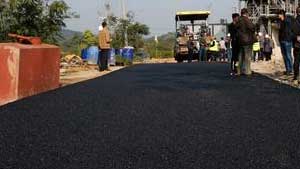
Hot mix asphalt pavement is a kind of asphalt pavement that is heated and mixed by artificial aggregate and asphalt in special equipment, transported to the construction site by heat preservation transportation means, and paved and compacted in hot state. Generally, the heating equipment needs to provide a working temperature of 150-290℃.
The advantages of hot mix asphalt pavement include:
- Fast Construction Speed: The construction period of hot mix asphalt pavement is relatively short, which can quickly complete construction tasks.
- Good Pavement Quality: The hot mix asphalt pavement has good smoothness, density, and skid resistance, which can meet the requirements of road use.
- Good Wear Resistance: Hot mix asphalt pavement has good wear resistance and can extend the service life of the road.
- Easy Maintenance: The maintenance of hot mix asphalt pavement is relatively simple and convenient, only requiring regular maintenance.
3. Warm Mix Asphalt Pavement
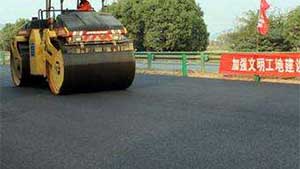
Warm mix asphalt pavement is a new type of asphalt pavement construction method, with a mixing temperature between hot mix asphalt mixture and cold mix asphalt mixture.
Compared with the same type of hot mix asphalt mixture, warm mix asphalt mixture can reduce the mixing temperature of the asphalt mixture by more than 30 – 40 ℃ through technical means on the premise of basically not changing the asphalt mixture proportion and construction technology, and its performance can reach the new type of hot mix asphalt mixture.
Warm mix asphalt pavement has the following advantages:
- Reduce fuel consumption and save energy by over 20%.
- Reduce the emission of asphalt smoke, reduce environmental pollution and damage to the health of construction personnel.
- Reduce the aging of asphalt during the hot mix process and extend the service life of asphalt pavement.
- The mixing temperature decreased to 110 ℃ -130 ℃, and the rolling temperature decreased to 70 ℃ -110 ℃, prolonging the construction season.
4. Cold Mix Asphalt Pavement
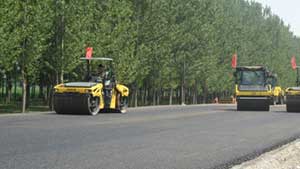
Cold mix asphalt mixture is a kind of mixture formed by mixing unheated ore (aggregate) and diluted asphalt. It is suitable for any weather and environment. Cold mix asphalt mixture is suitable for a wide range of ambient temperature, which can be used between – 20℃ and 50℃.
The use of cold mix asphalt mixture can repair the pavement in time, keep the pavement fresh, ensure the pavement smooth, reduce the number of pavement repair, and extend the road life.
The advantages of cold mix asphalt pavement mainly include:
- Good Environmental Friendliness: Cold mixed asphalt pavement does not require heating, so it does not produce a large amount of smoke and exhaust gas, and has less environmental pollution.
- Easy Construction: The cold mixed asphalt pavement can be directly removed from the packaging drum without the need for specialized heating equipment, and the construction process is very simple and fast.
- Good Maintenance Effect: Due to the very fine formula of cold mix asphalt, the ratio can be adjusted according to the actual situation, resulting in a smoother, more solid, and durable road surface after filling.
- High Economy: Compared to traditional hot mix asphalt methods, cold mix asphalt has lower costs and can save costs while ensuring maintenance effectiveness.
- Short Construction Time: As cold mixed asphalt pavement does not require heating, it can shorten construction time and improve construction efficiency.
- Wide Applicability: Cold mix asphalt pavement can be used under different climatic conditions, such as high temperature, low temperature, rainy season, etc.
- Good Durability: Cold mix asphalt pavement has good durability and can meet the requirements of road use.
- Good Anti Slip Performance: Cold mixed asphalt pavement has good anti slip performance, which can improve driving safety.
5. Quiet Asphalt Pavement
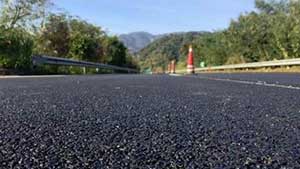
Quiet asphalt pavement is one of the main measures to reduce highway noise. Quiet asphalt pavement is full of pores, the principle of porous sound absorption is used to achieve noise reduction, so porosity is the primary factor affecting the acoustic performance of quiet asphalt pavement.
The quiet asphalt pavement is located on the surface of the highway, which is a porous structure made of large pore asphalt concrete. It can reduce the noise by 5 dB to 8 dB.
The quiet asphalt pavement has the following advantages:
- Reducing Noise: Quiet asphalt pavement has lower noise levels, which can reduce the impact of traffic noise on the environment.
- Good Smoothness: The quiet asphalt pavement has good smoothness and can provide good driving comfort.
- Aesthetics: The quiet asphalt pavement can be designed according to different colors and textures, presenting a more beautiful visual effect.
6. Coal Asphalt Pavement

Coal asphalt is a byproduct of coking or gas production. The volatiles from the carbonization of bituminous coal are condensed into coal tar. The residue after the extraction of various oil products by coal tar fractionation is coal asphalt.
Coal asphalt pavement has good anti-corrosion ability and cohesiveness, especially suitable for pavement, parking lot and so on.
Coal asphalt pavement has the following advantages:
- Widely Resourced: The raw materials of coal tar mainly come from resources such as coal and oil, which have relatively abundant reserves on Earth.
- Large Production Capacity: Due to the abundant source of raw materials for coal tar pitch, its production capacity is relatively large, which can meet the needs of large-scale production
- Cheap Price: Coal tar pitch has a wide range of raw materials and is cheap, which gives it a certain cost advantage in certain fields of application.
- High Viscosity: Coal tar pitch has a high viscosity and is easy to adhere to equipment such as pipelines and containers, which brings great inconvenience to production and use.
- Good Anti-Corrosion and Bonding Ability: Coal tar pitch has good anti-corrosion and bonding ability, so it can be used to prepare anti-corrosion coatings, adhesives, waterproof coatings, ointments, and make felt.
7. Petroleum Asphalt pavement

In petroleum asphalt pavement, petroleum asphalt is mainly used as cementitious material, which is used to prepare asphalt concrete, asphalt mortar and other asphalt mixture together with mineral materials such as crushed stone and sand.
The petroleum asphalt pavement has good stability, plasticity and high safety factor.
The petroleum asphalt pavement has the following advantages:
- High Stability: Petroleum asphalt has high viscosity and consistency, and can be mixed with mineral materials to form a stable asphalt pavement.
- Seamless: The petroleum asphalt pavement has the characteristic of no seams, which can improve the comfort and safety of driving.
- Short Construction Period: The construction period of petroleum asphalt pavement is relatively short, which can quickly complete construction tasks.
8. Colored Asphalt Pavement
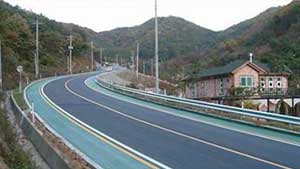
Colored asphalt pavement refers to the mixture of decolorized asphalt and various color stones, color materials, additives and other materials at a specific temperature, which can be prepared into a variety of colored asphalt mixture, which is then paved and rolled to form a colored asphalt concrete pavement with certain strength and road performance. Also known as color asphalt pavement.
Colored asphalt pavement is not only convenient for traffic management, but also has good road performance. Under the action of different temperature and external environment, its temperature stability, water damage resistance and durability are very good, and it does not deform, and has good adhesion with the base.
The advantages of colored asphalt pavement mainly include:
- Aesthetics: Colored asphalt road masks have rich colors and patterns, which can add beauty to the road, attract people’s attention, and improve the driver’s driving experience.
- Safety: Colored asphalt road masks have good reflective performance and can maintain high visibility even at night or under other low visibility conditions, which helps improve the driver’s driving safety.
- Anti Slip Performance: Colored asphalt pavement has a high coefficient of friction, which can enhance the vehicle’s grip and reduce the risk of slipping.
- Induceability: Different colored asphalt pavement can induce traffic flow, making traffic management more intuitive.
- Environmental Friendliness: Colored asphalt pavement does not use or uses less petroleum fuels, making it environmentally friendly.
Main Features of Asphalt Pavement
Asphalt pavement is usually used to pave the surface layer of highway, which is directly affected by vehicle load and atmospheric factors. At the same time, the physical and mechanical properties of asphalt mixture are greatly affected by climatic factors and time factors, Therefore, asphalt pavement must have the following important features:
1. High Temperature Stability
High temperature stability is the ability of asphalt pavement to resist flow and deformation. As the strength and rigidity of asphalt pavement decrease significantly with the increase of temperature.
in order to ensure that the asphalt pavement will not produce waves, displacements and ruts under repeated driving loads in high temperature season, the asphalt pavement should have good high temperature stability.
2. Low Temperature Crack Resistance
Low temperature crack resistance refers to the ability of asphalt pavement to resist low temperature shrinkage cracks. As the temperature of asphalt pavement decreases, the stiffness increases, and the expansion capacity decreases.
Under the action of external load, part of the stress is too late to relax, and the stress gradually accumulates. When the accumulated stress exceeds the tensile strength of the material, it will crack, which will lead to the damage of the pavement.
3. Water Stability
Water stability refers to the ability of asphalt pavement to resist the erosion of water and gradually produce asphalt membrane peeling, dropping, loosening, pit and groove damage.
This is due to the existence of water, on the one hand, it reduces the cohesion of asphalt itself, and on the other hand, it also destroys the cohesion between asphalt and mineral aggregate in asphalt pavement, thus accelerating the occurrence of peeling off and causing water damage to the road.
4. Fatigue Resistance
Fatigue resistance refers to the ability of asphalt pavement to resist damage under repeated load. It is due to the repeated action of wheel load during the use of asphalt pavement, which is in the state of stress-strain overlapping change for a long time, resulting in the gradual decline of pavement structure strength.
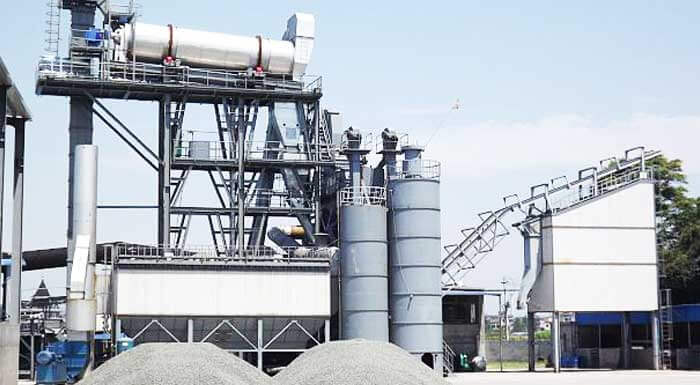 What Is Asphalt Concrete | Types & How Is It Made
What Is Asphalt Concrete | Types & How Is It Made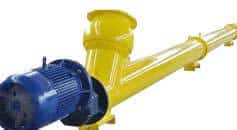 Screw Conveyor Features | Working Principle and Types
Screw Conveyor Features | Working Principle and Types 20 Common Types of Cement [Properties & Uses]
20 Common Types of Cement [Properties & Uses]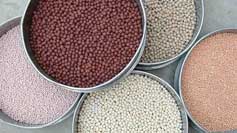 Hot 3 Types of Oil Fracturing Proppants | Features
Hot 3 Types of Oil Fracturing Proppants | Features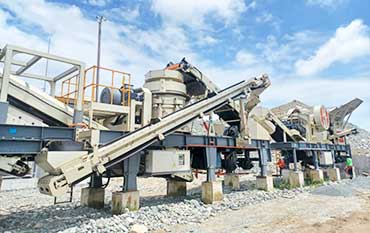
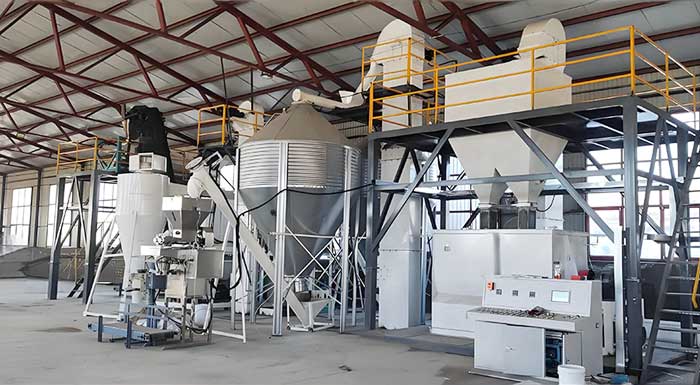
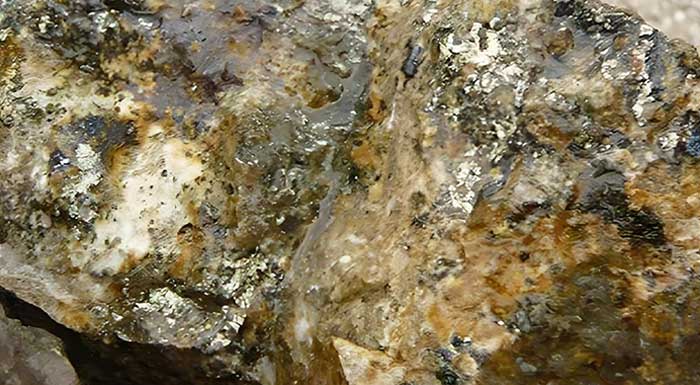

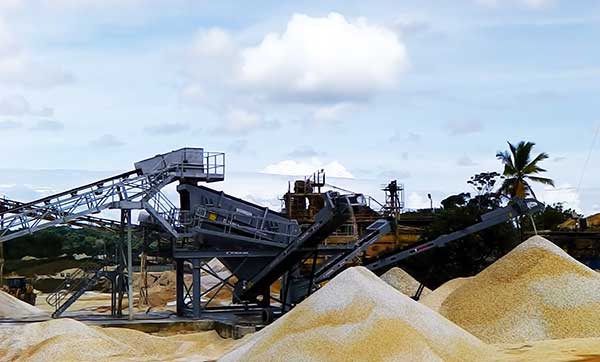
The idea of using road pavement that can reduce the noise of the cars that drive inside it is very interesting. My uncle is interested in paving his driveway, but he’s not sure where to start. I’ll recommend that he contact an asphalt paving expert so he’d consider it.